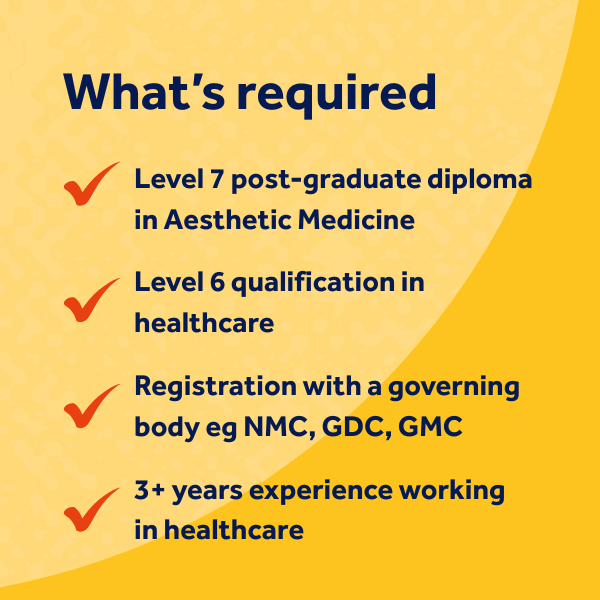
Aesthetics is becoming a more popular field for nurses to move into. It offers career flexibility, higher earnings potential, and the job security that comes with an industry that’s growing every year.
You might be thinking: ‘The aesthetics industry isn’t regulated, anyone can administer treatments, they don’t have to be nurses.’
As of 2025, you’re right. But that’s probably going to change in the near future.
Scotland introduced draft legislation this year for a three-tiered system. This would categorise aesthetics treatments by risk level. Many of which would have to be conducted by a trained and qualified nurse.
Businesses are already beginning to prepare for this. Which means there’s plenty of opportunity for nurses who are looking to make a career change.
In this guide, we’re going to delve into what an aesthetics nurse does, as well as what qualifications and training you need to get started. We’ll also help you plan your career change by going over some realistic timeframes. And finally, we’ll talk about insurance for aesthetics nurses, an area of expertise for us.
What does an aesthetics nurse do?
So, you’re interested in a change of career, but you probably want a bit more info about the day-to-day of an aesthetics nurse. Makes sense.
In many ways, it won’t differ too much from a nursing role in the healthcare industry.
You’ll be expected to consult with patients. Assessing their needs, discussing treatment options, and offering advice. Going hand-in-hand with this, you’ll have to maintain meticulous patient records to ensure safety and compliance with any future regulatory changes.
Before a treatment, you’ll have to educate patients on what they can expect and what the treatment will involve. Managing expectations will be key, as will providing clear post-treatment care instructions.
Finally, you’ll have to perform a variety of aesthetics procedures. As a qualified nurse, you’ll administer Botox, dermal fillers, chemical peels, micro-needling, and more.
Under Scotland’s proposed system, these are all procedures that only medically qualified professionals will be able to carry out. So, your skills and expertise will only be more in demand as time goes on.
There are more specialised roles within aesthetics nursing, such as assistance with cosmetic surgery, but we’ll focus on a more typical role in this guide.
Ultimately, your role is to help patients achieve their aesthetics goals while administering treatments safely.
What qualifications do you need to be an aesthetics nurse?
We’ll provide an overview here, but for a complete breakdown, take a look at our guide on aesthetics qualifications.
Governing bodies, like the Nursing and Midwifery Council (NMC) and the Joint Council for Cosmetic Practitioners (JCCP) recommend the following qualifications for an aesthetics nurse:

As a working nurse, you’re probably only missing the post-graduate diploma. Let’s talk about how to get that.
Back to school
First things first, where can you go to start your post-grad diploma? A good rule of thumb is to check with your governing body.
The NMC, for example, have a lot of guidance readily available and can point you in the right direction.
Typically, you’ll be dipping back into the world of higher education. Universities and academies up and down the country offer Level 7 post-grad diplomas in aesthetic medicine and injectables.
Which one you opt for will depend on a few different factors:
- Cost of the course – depending on your specific circumstances, which institution you opt for, and your existing qualifications, you could pay as little as £3,000 or as much as £10,000.
- Whether you want to study full-time or part-time – some institutions won’t allow part-time study, so make sure you check this before committing.
- How it fits around your current job – the flexibility of the course will be key. If you’re planning on working and studying part-time, make sure the course fits around your work hours.
- The length of the course – each institution differs, but part-time study can take anywhere from 12-36 months, depending on how much time you can commit. Make sure the length of the course fits with your goals.
- Reputation of the institution – do your homework on the reputation of each institution before committing. Ideally, try and find out the names and credentials of course tutors too, as this could influence your decision.
Looking to up your game in the future and become a nurse prescriber? The V300 course is what you’ll need to aim for. This will require you to already have your post-grad diploma, and comes with a lot more scrutiny in the form of supervised clinical hours, extra responsibilities, and more advanced evaluations.
This proficiency guide from the NMC has all the info you need on becoming a nurse prescriber.
Setting up as an aesthetics nurse
If you’re interested in going solo and setting up your own business, check out our guide on starting an aesthetics business.
We’ll give you a quick overview here, but if you’re looking to join an existing aesthetics business, you don’t need to worry about this section.
Here’s a quick rundown on starting your own aesthetics business:
- Mobile, home-based, or premises – consider where you want to run your business from. Each have their own pros and cons, including what treatments you can offer, how it appeals to your clients, and more.
- Sole trader or limited company – think about how you’ll set up your business. Sole traders and limited companies have different ways of operating and choosing one will depend on your goal and situation. Check out the government’s business set up guide for more info.
- Estimate your costs – financial planning is key when setting up a business. Factor in your certification costs, equipment and tools, insurance, marketing, and overheads.
- Write a business plan – ideally, write this before you get started. It helps you map out how you want to grow, your business’ strategy, and gives you a general trajectory for the future. The government has a bunch of useful resources to help you create a business plan.
- Stay on top of your finances – set up a business bank account, track your income and expenses meticulously, and don’t forget to file your self-assessment tax return or annual accounts report, depending on how you set up your business.
- Market yourself – set up a website and social media accounts. Be consistent in your approach as slacking on your marketing could hurt your growth. Don’t forget to set up a free Google Business Profile for local visibility.
- Prioritise client safety – create comprehensive consent forms, provide clear and easy to understand aftercare instructions, and keep comprehensive patient records.
This leads us perfectly to a very important question...
Do I need insurance as an aesthetics nurse?
The short answer is: yes. But it does depend on your circumstances.
If you’re starting your own business, you unequivocally need insurance. It’s a requirement for any governing body. And, when an accident happens, you’ll need the financial protection that insurance gives you.
If you’re joining an existing aesthetics business as an employee, you'll still need your own insurance for the treatments you administer. This is because you could be named individually in a claim or complaint, which could make you personally liable. Even if the business you work for has insurance.
Here are the types of cover you’ll need:
- Medical malpractice insurance – the most important type of insurance you’ll need. It covers you for when you make a mistake during a treatment, leading to a customer’s injury, illness, or death. It pays for your legal fees and any compensation you’re required to pay.
- Public liability (PL) insurance – if you’re running your own business, this covers you if a customer injures themselves or their property is damaged on your premises and it’s deemed to be your fault. If you’re employed by an aesthetics business, it covers you for non-treatment accidents that are your fault. PL pays for your legal fees and any compensation you might owe.
- Business contents insurance – this one is for the business owners. It pays to repair or replace broken, damaged, or stolen assets on your premises.
- Portable equipment insurance – if you’re running a mobile clinic, this pays to repair or replace your equipment if it’s damaged, lost, or stolen when you’re out and about.
A new chapter
Changing careers is never easy but, as a nurse, you have a solid foundation to build on when moving into the world of aesthetics.
Whether you’re looking to start your own business or join an existing one, a Level 7 post-grad diploma is your gateway into the industry. Alongside having the right insurance, you’ll be all set to embark on an exciting new journey.
Have any questions on the insurance side of things? Or ready to talk to a broker? Aesthetics insurance is an area of expertise for us. Give us a call on 0345 216 0027.
Image used under license from iStock.
aestheticsbusiness advicebusiness guidesmedical malpracticenursingstarting a business
